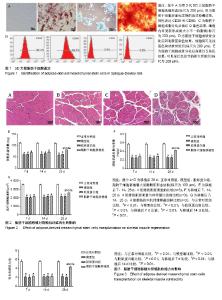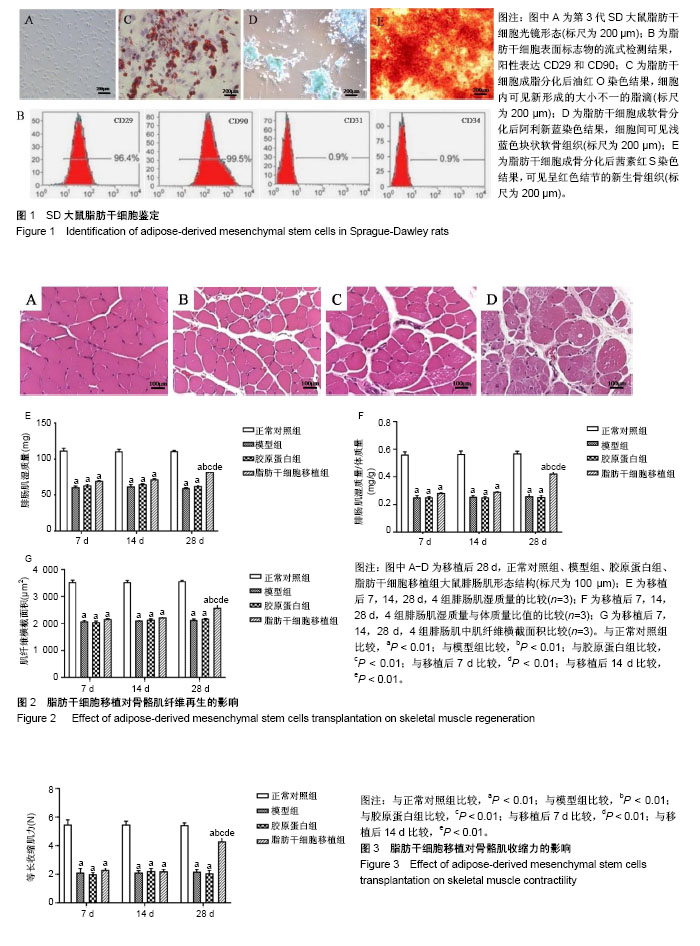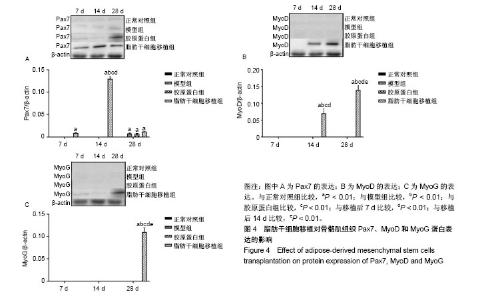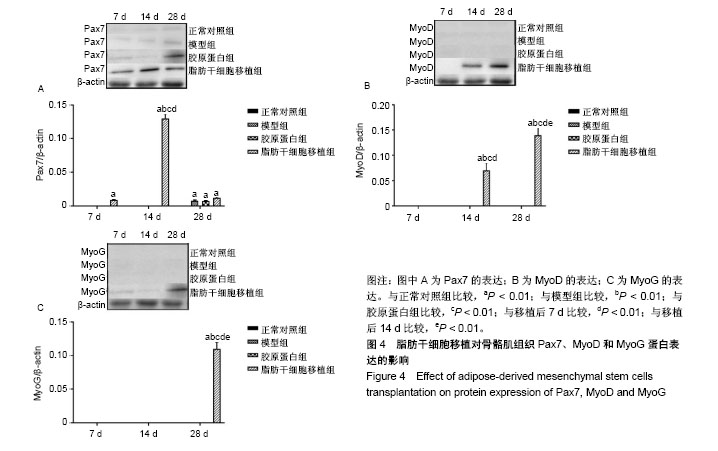Chinese Journal of Tissue Engineering Research ›› 2019, Vol. 23 ›› Issue (17): 2739-2745.doi: 10.3969/j.issn.2095-4344.1722
Previous Articles Next Articles
Transplantation of allogeneic adipose-derived mesenchymal stem cells promotes the recovery of skeletal muscle function
He Li1, 2, Zheng Xiaoli1
- 1School of Basic Medical Sciences, Southwest Medical University, Luzhou 646000, Sichuan Province, China; 2Jintang Hospital, West China Hospital of Sichuan University, Chengdu 610400, Sichuan Province, China
-
Revised:2019-01-24Online:2019-06-18Published:2019-06-18 -
Contact:Zheng Xiaoli, MD, Associate professor, School of Basic Medical Sciences, Southwest Medical University, Luzhou 646000, Sichuan Province, China -
About author:He Li, Master candidate, Attending physician, School of Basic Medical Sciences, Southwest Medical University, Luzhou 646000, Sichuan Province, China; Jintang Hospital, West China Hospital of Sichuan University, Chengdu 610400, Sichuan Province, China
CLC Number:
Cite this article
He Li, Zheng Xiaoli. Transplantation of allogeneic adipose-derived mesenchymal stem cells promotes the recovery of skeletal muscle function[J]. Chinese Journal of Tissue Engineering Research, 2019, 23(17): 2739-2745.
share this article

2.1 SD大鼠脂肪干细胞的鉴定结果 传代至第3代的脂肪干细胞形态均一,呈梭形或多角形,见图1A;流式细胞术检测结果显示,第3代大鼠脂肪干细胞表达间充质干细胞的表面标志物CD29和CD90,阳性率为96.4%和99.5%,不表达血管内皮细胞表面标志物CD31和造血干细胞标志物CD34,见图1B;油红O染色结果显示,脂肪干细胞胞质内有淡红色脂滴,大小不一,见图1C;阿利新蓝染色结果显示,细胞间可见浅蓝色块状组织,结构较致密,见图1D;茜素红S染色结果显示,细胞间可见暗红色结节,见图1E。上述结果提示,分离获得了脂肪干细胞。 2.2 实验大鼠数量分析 共使用72只SD大鼠进行体内实验,其中正常对照组18只,54只用于造模和移植,整个实验过程顺利,72只大鼠的实验结果计入数据分析。 2.3 脂肪干细胞移植对骨骼肌纤维再生的影响 为了观察新生肌纤维出现的时间将观察时间点设定为7,14,28 d,由于骨骼肌组织修复时间较长,在移植后7,14 d没有观察到组织学结构变化,只有28 d后才出现差异,故实验对28 d观察结果进行描述。组织学观察结果显示,移植后28 d,正常对照组骨骼肌纤维排列整齐,结构正常,见图2A;模型组局部骨骼肌纤维排列紊乱,肌纤维间距离增大,见图2B;胶原蛋白组肌组织结果与模型组相似,见图2C;脂肪干细胞移植组大鼠腓肠肌损伤部位周围出现散在分布的新生骨骼肌纤维,新生的骨骼肌纤维直径小于原有骨骼肌纤维,且肌纤维直径大小不等,细胞核位于细胞中央,见图2D;4组大鼠腓肠肌损伤部位均未观察到明显的纤维增生。为了进一步证实肌纤维的再生,测量了腓肠肌的湿质量及其与体质量的比值,见图2E,F。在移植后28 d,脂肪干细胞移植组、模型组和胶原蛋白组大鼠腓肠肌湿质量及其与体质量比值均低于正常对照组(P < 0.01),脂肪干细胞移植组腓肠肌湿质量及其与体质量比值则高于模型组和胶原蛋白组(P < 0.01);移植后28 d,脂肪干细胞移植组腓肠肌中肌纤维横截面积大于模型组和胶原蛋白组,差异有显著性意义(P < 0.01),见图2G。上述结果一致说明脂肪干细胞移植可促进骨骼肌纤维的再生,但不能明确新生骨骼肌纤维来源于移植的干细胞。 2.4 脂肪干细胞移植对骨骼肌收缩力的影响 移植后7,14,28 d,模型组、胶原蛋白组、脂肪干细胞移植组腓肠肌等长收缩肌力均低于正常对照组(P < 0.01);移植后28 d,脂肪干细胞移植组腓肠肌等长收缩肌力高于模型组和胶原蛋白组(P < 0.01),提示脂肪干细胞移植可改善骨骼肌的收缩力,见图3。 2.5 脂肪干细胞移植影响肌纤维的再生修复的时期 为了深入研究移植的脂肪干细胞是否在肌纤维再生的不同阶段均发挥作用,进行Western blot半定量检测。移植后14 d,脂肪干细胞移植组腓肠肌组织中Pax7和MyoD的表达高于模型组、胶原蛋白组和正常对照组,差异有显著性意义(P < 0.05);移植后28 d,脂肪干细胞移植组腓肠肌组织中MyoD和MyoG的表达高于模型组、胶原蛋白组和正常对照组,差异有显著性意义(P < 0.05),见图4。以上结果提示,脂肪干细胞移植通过影响肌纤维的早期与晚期再生发挥修复作用。"

| [1] Klimczak A, Kozlowska U, Kurpisz M. Muscle Stem/Progenitor Cells and Mesenchymal Stem Cells of Bone Marrow Origin for Skeletal Muscle Regeneration in Muscular Dystrophies. Arch Immunol Ther Exp (Warsz). 2018;66(5):341-354.[2] Costamagna D, Berardi E, Ceccarelli G, et al. Adult Stem Cells and Skeletal Muscle Regeneration. Curr Gene Ther. 2015;15(4):348-363.[3] Dumont NA, Bentzinger CF, Sincennes MC, et al. Satellite Cells and Skeletal Muscle Regeneration. Compr Physiol. 2015;5(3):1027-1059.[4] Marino S, Di Foggia V. Invited Review: Polycomb group genes in the regeneration of the healthy and pathological skeletal muscle. Neuropathol Appl Neurobiol. 2016;42(5):407-422.[5] Chazaud B. Inflammation during skeletal muscle regeneration and tissue remodeling: application to exercise-induced muscle damage management. Immunol Cell Biol. 2016;94(2):140-145.[6] Kozakowska M, Pietraszek-Gremplewicz K, Jozkowicz A, et al. The role of oxidative stress in skeletal muscle injury and regeneration: focus on antioxidant enzymes. J Muscle Res Cell Motil. 2015;36(6):377-393.[7] Bossola M, Marzetti E, Rosa F, et al. Skeletal muscle regeneration in cancer cachexia. Clin Exp Pharmacol Physiol. 2016;43(5):522-527.[8] Tu MK, Levin JB, Hamilton AM, et al. Calcium signaling in skeletal muscle development, maintenance and regeneration. Cell Calcium. 2016;59(2-3):91-97.[9] Almada AE, Wagers AJ. Molecular circuitry of stem cell fate in skeletal muscle regeneration, ageing and disease. Nat Rev Mol Cell Biol. 2016; 17(5):267-279.[10] Joanisse S, Nederveen JP, Snijders T, et al. Skeletal Muscle Regeneration, Repair and Remodelling in Aging: The Importance of Muscle Stem Cells and Vascularization. Gerontology. 2017;63(1):91-100.[11] Cruz-Martinez P, Pastor D, Estirado A, et al. Stem cell injection in the hindlimb skeletal muscle enhances neurorepair in mice with spinal cord injury. Regen Med. 2014;9(5):579-591.[12] Rahman MM, Ghosh M, Subramani J, et al. CD13 regulates anchorage and differentiation of the skeletal muscle satellite stem cell population in ischemic injury. Stem Cells. 2014;32(6):1564-1577.[13] Park JK, Ki MR, Lee EM, et al. Losartan improves adipose tissue-derived stem cell niche by inhibiting transforming growth factor-β and fibrosis in skeletal muscle injury. Cell Transplant. 2012;21(11):2407-2424.[14] Peçanha R, Bagno LL, Ribeiro MB, et al. Adipose-derived stem-cell treatment of skeletal muscle injury. J Bone Joint Surg Am. 2012; 94(7):609-617.[15] 王维,黄玉成,陈燕辉. 脂肪间充质干细胞对硬皮病小鼠皮损组织成纤维细胞增殖的影响及其机制[J].中国组织工程研究, 2018,22(33):5249-5254.[16] 张传辉,李建军,杨军.调控脂肪间充质干细胞成软骨分化基因 Sox-9和低氧诱导因子1α的表达[J].中国组织工程研究, 2016,20(45):6766-6773.[17] 杨记农,姜亦瑶,袁超,等.不同氧体积分数下脂肪间充质干细胞和脐带间充质干细胞的旁分泌能力[J].中国组织工程研究, 2018,22(21):3322-3327.[18] 罗翱,唐成林,黄思琴,等.骨骼肌急性钝挫伤修复过程中自噬相关因子的表达变化[J].中国应用生理学杂志, 2018,34(2):97-101,114.[19] 池凯,毋磊,陈龙金,等.人脱细胞真皮复合骨髓间充质干细胞构建组织工程皮肤修复皮肤创面缺损[J].中国组织工程研究, 2018,22(26):4179-4183.[20] 林小娟,唐毅,陈建豪,等. 脂肪干细胞移植对大鼠脑缺血后微血管生成及MT1-MMP表达的影响[J].中国实用神经疾病杂志, 2018,21(14): 1514-1520.[21] 王杨文洁,刘肇杰,安惠暄,等. 4周有氧运动介导apelin对小鼠骨骼肌UCP3表达的影响[J].中国运动医学杂志, 2018,37(9):772-777.[22] 张昕,李志清. 跑台运动训练对大鼠腓肠肌结构及最大收缩张力的影响[J]. 西北大学学报(自然科学版),2013,43(1):70-74.[23] Winkler T, von Roth P, Matziolis G, et al. Dose-response relationship of mesenchymal stem cell transplantation and functional regeneration after severe skeletal muscle injury in rats. Tissue Eng Part A. 2009;15(3): 487-492.[24] Ren Y, Wu H, Ma Y, et al. Potential of adipose-derived mesenchymal stem cells and skeletal muscle-derived satellite cells for somatic cell nuclear transfer mediated transgenesis in Arbas Cashmere goats. PLoS One. 2014;9(4):e93583.[25] Lee EM, Kim AY, Lee EJ, et al. Therapeutic effects of mouse adipose-derived stem cells and losartan in the skeletal muscle of injured mdx mice. Cell Transplant. 2015;24(5):939-953.[26] Rybalko V, Hsieh PL, Ricles LM, et al. Therapeutic potential of adipose-derived stem cells and macrophages for ischemic skeletal muscle repair. Regen Med. 2017;12(2):153-167.[27] Pinheiro CH, de Queiroz JC, Guimarães-Ferreira L, et al. Local injections of adipose-derived mesenchymal stem cells modulate inflammation and increase angiogenesis ameliorating the dystrophic phenotype in dystrophin-deficient skeletal muscle. Stem Cell Rev. 2012;8(2):363-374.[28] Mizuno H. The potential for treatment of skeletal muscle disorders with adipose-derived stem cells. Curr Stem Cell Res Ther. 2010;5(2):133-136.[29] Gorecka A, Salemi S, Haralampieva D, et al. Autologous transplantation of adipose-derived stem cells improves functional recovery of skeletal muscle without direct participation in new myofiber formation. Stem Cell Res Ther. 2018;9(1):195.[30] Crist C. Emerging new tools to study and treat muscle pathologies: genetics and molecular mechanisms underlying skeletal muscle development, regeneration, and disease. J Pathol. 2017;241(2):264-272.[31] Dueweke JJ, Awan TM, Mendias CL. Regeneration of Skeletal Muscle After Eccentric Injury. J Sport Rehabil. 2017;26(2):171-179.[32] Delaney K, Kasprzycka P, Ciemerych MA, et al. The role of TGF-β1 during skeletal muscle regeneration. Cell Biol Int. 2017;41(7):706-715.[33] Gonçalves TJM, Armand AS. Non-coding RNAs in skeletal muscle regeneration. Noncoding RNA Res. 2017;2(1):56-67.[34] Ultimo S, Zauli G, Martelli AM, et al. Influence of physical exercise on microRNAs in skeletal muscle regeneration, aging and diseases. Oncotarget. 2018;9(24):17220-17237.[35] Baghdadi MB, Tajbakhsh S. Regulation and phylogeny of skeletal muscle regeneration. Dev Biol. 2018;433(2):200-209.[36] Saba JD, de la Garza-Rodea AS. S1P lyase in skeletal muscle regeneration and satellite cell activation: exposing the hidden lyase. Biochim Biophys Acta. 2013;1831(1):167-175.[37] Ryall JG. Metabolic reprogramming as a novel regulator of skeletal muscle development and regeneration. FEBS J. 2013;280(17): 4004-4013.[38] Juban G, Chazaud B. Metabolic regulation of macrophages during tissue repair: insights from skeletal muscle regeneration. FEBS Lett. 2017; 591(19):3007-3021. |
| [1] | Fan Quanbao, Luo Huina, Wang Bingyun, Chen Shengfeng, Cui Lianxu, Jiang Wenkang, Zhao Mingming, Wang Jingjing, Luo Dongzhang, Chen Zhisheng, Bai Yinshan, Liu Canying, Zhang Hui. Biological characteristics of canine adipose-derived mesenchymal stem cells cultured in hypoxia [J]. Chinese Journal of Tissue Engineering Research, 2021, 25(7): 1002-1007. |
| [2] | Li Cai, Zhao Ting, Tan Ge, Zheng Yulin, Zhang Ruonan, Wu Yan, Tang Junming. Platelet-derived growth factor-BB promotes proliferation, differentiation and migration of skeletal muscle myoblast [J]. Chinese Journal of Tissue Engineering Research, 2021, 25(7): 1050-1055. |
| [3] | Chen Yang, Huang Denggao, Gao Yuanhui, Wang Shunlan, Cao Hui, Zheng Linlin, He Haowei, Luo Siqin, Xiao Jingchuan, Zhang Yingai, Zhang Shufang. Low-intensity pulsed ultrasound promotes the proliferation and adhesion of human adipose-derived mesenchymal stem cells [J]. Chinese Journal of Tissue Engineering Research, 2021, 25(25): 3949-3955. |
| [4] | Sun Weixing, Zhao Yongchao, Zhao Ranzun. Mesenchymal stem cell transplantation in the treatment of myocardial infarction: problems, crux and new breakthrough [J]. Chinese Journal of Tissue Engineering Research, 2021, 25(19): 3103-3109. |
| [5] | Chen Xiao, Guo Zhi, Chen Lina, Liu Xuanyong, Zhang Yihuizhi, Li Xumian, Wang Yueqiao, Wei Liya, Xie Jing, Lin Li. Factors affecting the mobilization and collection of autologous peripheral blood hematopoietic stem cells [J]. Chinese Journal of Tissue Engineering Research, 2021, 25(19): 2958-2962. |
| [6] | Zhang Jianhui, Ma Heran, Tan Yi, Wang Zhihui. Knee injury repair using human adipose-derived mesenchymal stem cells-based scaffold-free three-dimensional gel-like construct in pigs [J]. Chinese Journal of Tissue Engineering Research, 2021, 25(19): 2969-2975. |
| [7] | Liu Yunyi, Wang Bo, Wang Lin. Effects of post-exercise gastrocnemius needling on Achilles tendon degeneration in obese rats [J]. Chinese Journal of Tissue Engineering Research, 2021, 25(14): 2211-2218. |
| [8] | Qian Nannan, Zhang Qian, Yang Rui, Ao Jun, Zhang Tao. Mesenchymal stem cells in the treatment of spinal cord injury: cell therapy and combination of new drugs and biomaterials [J]. Chinese Journal of Tissue Engineering Research, 2021, 25(13): 2114-2120. |
| [9] | Cao Linlin, Ding Kaiyang, Song Hao, Wu Guolin, Hu Maogui, Fan Dandan, Zhou Chenyang, Wang Cuicui, Feng Yuanyuan. Efficacy and influencing factors of autologous hematopoietic stem cell transplantation in the treatment of malignant lymphoma [J]. Chinese Journal of Tissue Engineering Research, 2021, 25(13): 1993-1998. |
| [10] | Zhang Wenjian, Ma Lingfu, Wang Zhimin, Mo Wenjian, Zhou Ruiqing. Muscle mass evaluation and influencing factors of sarcopenia in allogeneic hematopoietic stem cell transplantation patients [J]. Chinese Journal of Tissue Engineering Research, 2021, 25(13): 1999-2004. |
| [11] | Chen Ganghong, Zeng Chaoming, Chen Ziming, Liao Junxing, Ma Yuanchen, Zheng Qiujian . Intra-articular injection of optimal concentration of bone marrow mesenchymal stem cells for treating rabbit cartilage defects [J]. Chinese Journal of Tissue Engineering Research, 2020, 24(7): 996-1001. |
| [12] | Wang Guoyu, Cheng Zhijian, Yang Baohui, Li Haopeng, He Xijing. Olfactory ensheathing cell transplantation promotes the ultrastructure repair at the lesion site of rat models of spinal cord injury [J]. Chinese Journal of Tissue Engineering Research, 2020, 24(5): 699-703. |
| [13] | Shang Qingqing, Zhou Jianye. Combination of hyaluronic acid hydrogel and bone marrow mesenchymal stem cells promotes cardiac function after myocardial infarction in rats (II) [J]. Chinese Journal of Tissue Engineering Research, 2020, 24(34): 5559-5563. |
| [14] | Zhang Suping, Sun Ling, Wan Dingming, Cao Weijie, Li Li, Liu Changfeng, Liu Yufeng, Wang Dao, Guo Rong, Jiang Zhongxing, Xie Xinsheng. Effectiveness of unrelated peripheral blood stem cell transplantation in the treatment of severe aplastic anemia [J]. Chinese Journal of Tissue Engineering Research, 2020, 24(31): 4994-5001. |
| [15] | Yang Zhen, Li Hao, Gao Cangjian, Fu Liwei, Tian Guangzhao, Zha Kangkang, Sun Zhiqiang, Li Xu, Guo Weimin, Sui Xiang, Huang Jingxiang, Liu Shuyun, Lu Shibi, Guo Quanyi . Regulation of stem cells by transforming growth factor β3/polylactic acid-glycolic acid microspheres [J]. Chinese Journal of Tissue Engineering Research, 2020, 24(28): 4540-4546. |
| Viewed | ||||||
|
Full text |
|
|||||
|
Abstract |
|
|||||

